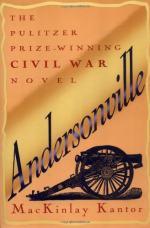“We cheered till everything seemed to split, and jumped over the works, almost every man at the same minute. The Johnnies seemed to have been puzzled at the stoppage of our fire. When we all came sailing over the works, with guns brought right, down where they meant business, they were so astonished for a minute that they stood stock still, not knowing whether to come for us, or run. We did not allow them long to debate, but went right towards them on the double quick, with the bayonets looking awful savage and hungry. It was too much for Mr. Johnny Reb’s nerves. They all seemed to about face’ at once, and they lit out of there as if they had been sent for in a hurry. We chased after ’em as fast as we could, and picked up just lots of ’em. Finally it began to be real funny. A Johnny’s wind would begin to give out he’d fall behind his comrades; he’d hear us yell and think that we were right behind him, ready to sink a bayonet through him’; he’d turn around, throw up his hands, and sing out:
“I surrender, mister! I surrender!’ and find that we were a hundred feet off, and would have to have a bayonet as long as one of McClellan’s general orders to touch him.
“Well, my company was the left of our regiment, and our regiment was the left of the brigade, and we swung out ahead of all the rest of the boys. In our excitement of chasing the Johnnies, we didn’t see that we had passed an angle of their works. About thirty of us had become separated from the company and were chasing a squad of about seventy-five or one hundred. We had got up so close to them that we hollered:
“‘Halt there, now, or we’ll blow your heads off.’
“They turned round with, ‘halt yourselves; you —— Yankee —— ——’
“We looked around at this, and saw that we were not one hundred feet away from the angle of the works, which were filled with Rebels waiting for our fellows to get to where they could have a good flank fire upon them. There was nothing to do but to throw down our guns and surrender, and we had hardly gone inside of the works, until the Johnnies opened on our brigade and drove it back. This ended the battle at Spottsylvania Court House.”
Second Boy (irrelevantly.) “Some day the underpinning will fly out from under the South, and let it sink right into the middle kittle o’ hell.”
First Boy (savagely.) “I only wish the whole Southern Confederacy was hanging over hell by a single string, and I had a knife.”
CHAPTER XLIV.
Rebel music—singular lack of the creative power among the southerners —contrast with similar people elsewhere—their favorite music, and where it was borrowed from—A fifer with one tune.




